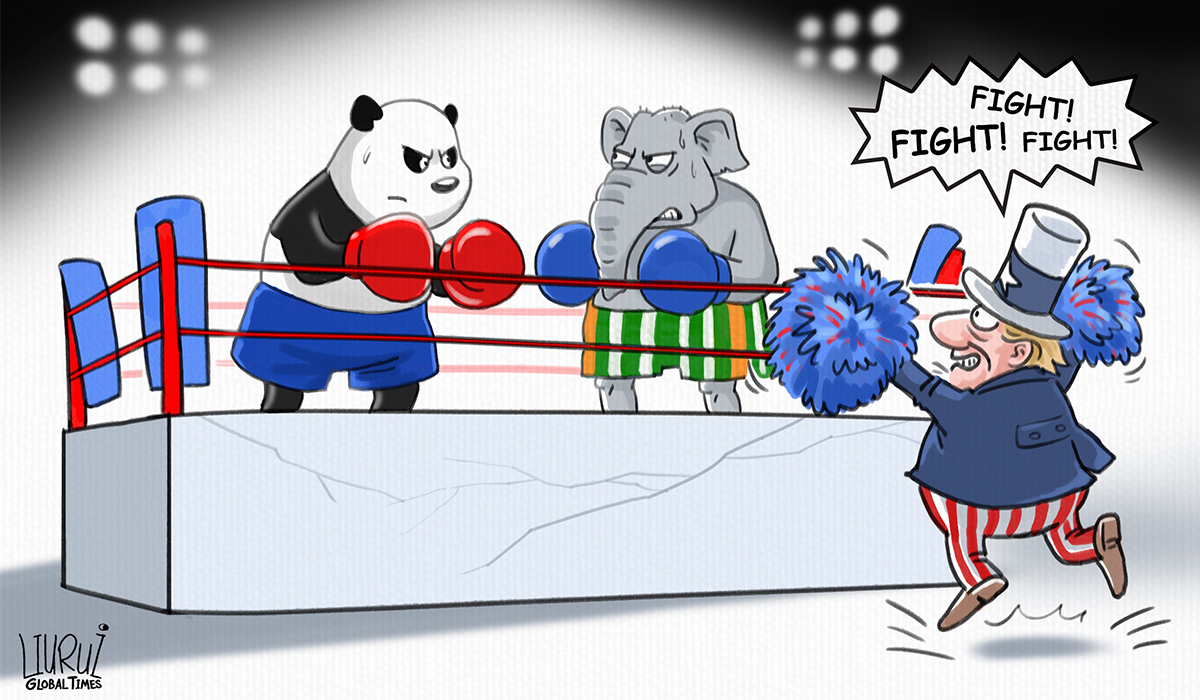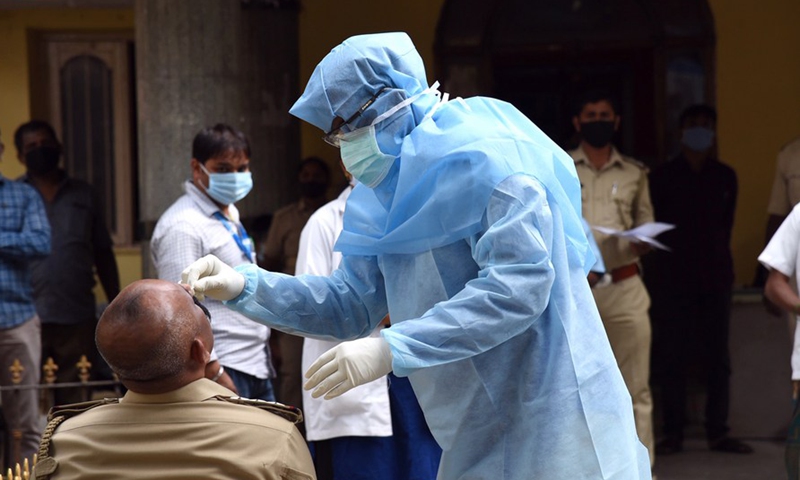Who are fanning ‘boycott China’ campaign in India?
By GT Staff Reporters Source:Global Times Published: 2020/6/19 22:53:40
Simmering nationalism blows locals economically

With an undisguised glee, Uncle Sam is nudging India into further spats with China. Illustration: GT
A boycott campaign in India targeting Chinese products and technology in the wake of a border clash between the two Asian giants is an angry outburst that won't do the coronavirus-hit Indian economy any favors, regional affairs watchers said on Friday.Following the recent border clash - the most serious military confrontation between the two sides in 40 years - Indians launched a campaign to boycott Chinese products, with many breaking their made-in-China mobile phones and TV sets and taking to social media platforms to call for a boycott of China.
The China-India partnership has brought many opportunities to the South Asian nation, with the availability of Chinese phones, among other tech products, substantially ramping up the local push for digitalization, Bai Ming, a research fellow at the Chinese Academy of International Trade and Economic Cooperation, told the Global Times on Friday.
The sheer irrationality of boycotting Made in China products, hardly a new thing, would only end up dealing a blow to the local people in India who have benefited from Chinese investment, Bai said.
Chinese firms have invested in green field investments and in acquiring or expanding existing facilities in India, according to a Brookings Institution report in March. This is in addition to their investments in Indian businesses, mostly in pharmaceuticals and technology, the report said. Chinese firms have also committed to plans or bids for major infrastructure projects that have yet to be approved in India.
When asked to comment on the Indian move to boycott Chinese items, Foreign Ministry Spokesman Zhao Lijian said on Friday that China attaches great importance to China-India relations and hopes the two can work to safeguard the long-term development of ties. Responsibility for the border clash rests entirely on India, he said.
On Wednesday, the local traders' body, Confederation of All India Traders (CAIT), said Wednesday it will further mobilize traders in India to boycott Chinese items and support indigenous products, Indian media reported.
The CAIT released a list of 500 categories of items imported from China that the confederation said could be swapped for Indian-made goods, such as apparel, consumer electronics and toys.
The boycott, adding to the Indian government's regulatory toughening on foreign investment, notably Chinese investment in the country, would dampen Chinese firms' interest in investing in the local market, inevitably pulverizing India's push for its manufacturing, Liu Xiaodong, chief representative of the China Council for the Promotion of International Trade (CCPIT), told the Global Times on Friday.
By the end of 2019, roughly 1,000 Chinese firms have invested in India or opened facilities in the country, involving investment of over $8 billion and creating 200,000 jobs in the local market. Liu expected that Chinese firms' investment in India has thus far hit $10 billion.

An Indian health worker takes a swab sample of a policeman, as new cases of COVID-19 were reported from a police station in Bangalore, India, June 16, 2020. (Str/Xinhua)
Blow to IndiaContrary to a nationalist victory for a boycott of Made in China goods naively envisioned by some local traders, the boycott could end up with India falling victim, business insiders said.
Geopolitical tensions between China and India could put a damper on Chinese businesses considering investing in India, although the clashes may not have a long-lasting effect, according to Xie Chi, a senior sales manager of the Sub-Council of Chemical Industry under the China Council for the Promotion of International Trade, who has been to India and maintains close contacts with Chinese businesses planning to invest in India.
A Chinese telecoms industry insider said if India bans Chinese telecoms equipment makers from its market, it may lead to an increase of procurement costs by around 20 percent.
The comments were made after Reuters reported that India told two state-run telecoms firms to use local rather than Chinese telecoms equipment to upgrade their mobile networks to 4G, citing a senior government source on Thursday.
New Delhi's move comes amid recent border disputes between China and India, and is widely believed to target Chinese telecoms equipment makers Huawei and ZTE.
"Our equipment is cheap and easy to produce, which is hard for our rivals to achieve," independent market watcher Ma Jihua told the Global Times on Friday.
According to Liu, the manufacture of handsets in India relies on China for 30-40 percent of component imports, Liu revealed, noting that the absence of an integral supply chain subjects India to continued investment from China, rather than the other way around.
Simmering hostile sentiment
While India has similar boycott Chinese product campaigns every time disputes erupt in the last three years, experts said this time, the anti-China sentiment is stronger given that the country is being hit hard by the epidemic, and 20 Indian soldiers reportedly died in the clash.
China-related hashtags and posts are trending on Indian social media, with numerous posts containing insults and pictures reflecting negatively on China.
"If I [had a] gun I [would] kill at least 100 Chinese soldiers before I die," read one post from an Indian netizen on Twitter. Another net user wrote that they would "destroy" China with atom and hydrogen bombs.
Some celebrities also fueled the confrontation in the "boycott China" campaign on Twitter. Indian Union Minister Ramdas Athawale appealed on Wednesday for a boycott of "Chinese food and restaurants." Cricketer Harbhajan Singh urged a "ban of all Chinese products."
Wang Dehua, an advisor of the Chinese Association for South Asian Studies and research fellow at the Shanghai Institutes for International Studies, told the Global Times on Friday that some Indian politicians are intentionally aggravating the current tensions to divert domestic attention from their failure to control the pandemic.
He urged these Indian opinion leaders to focus on India's COVID-19 outbreak.
India has reported 366,946 confirmed COVID-19 cases as of Thursday morning, ranking fourth globally, according to data released on the website of India's health authority.
Lau, a Chinese communications equipment exporter living in the Philippines, has almost half of his clients from India. Lau said that based on his observations, Indian netizens - especially younger ones - are easily inflamed by nationalism, which makes them extreme and irrational.
Contrary to irrational Indian netizens, many Chinese netizens have taken to China's Twitter-like Sina Weibo to call for peace and restraint this time.
Long Xingchun, a senior research fellow at the Academy of Regional and Global Governance under the Beijing Foreign Studies University and president of the Chengdu Institute of World Affairs, told the Global Times that the strong anti-China sentiment among ordinary Indians is also due to the result of propaganda from local news outlets, aggressive nationalists, and even some scholars.
Some Indian policymakers and think tanks have also been working together to orchestrate a wave of anti-China sentiment, and they view China and Sino-Indian relations through a pro-US lens, Long said.
Local Indian media reports about the latest border clash are not based on facts but demonize China in the clash, which triggered discontent among average folk against China, analysts said.
The Global Times interviewed several Chinese nationals working in India. Some said they do not dare go outside out of safety concerns, and want to return to China. One Chinese national was even kicked out of his apartment because the residential community's administrator demanded he get tested for the virus, citing other Indian residents worried of contracting it.
Xiao Jun, a Chinese observer who has lived in India for a few years, told the Global Times that anti-China forces in India can normally be divided into four groups. The first are the "diehards" who see China as a hostile power.
They are often deeply affected by the Sino-Indian war of 1962, in which some of their loved ones were killed.
The second are the ultranationalists, who have lobbied against Chinese goods like Huawei's technology. These extreme nationalists are not only against China, but against any country they see as hurting their national pride.
The third are anti-China politicians, who use anti-China sentiment as a stepping stone for their careers. And the fourth are India's intellectuals and middle class who are sometimes obsessed with and often blindly obey Western values, Xiao said.
US of no help
Experts told the Global Times on Friday that Indian Prime Minister Narendra Modi stoked nationalism during his tenure to appeal to more voters. However, this "nationalism" is a double-edged sword.
Long told the Global Times that Modi tried to depict China as a threat to India to raise his approval rating, but India cannot compete with China in terms of economy, the military and other fields. Nationalism may win Modi greater support, but it could hurt India's long-term development if it treats China as an enemy.
Amid the border clash between China and India, some Western media outlets brought up topics that the US and its allies want India's help in confronting China.
Long noted that India should realize that the US can only provide limited help, and that this cannot change the balance of power between the two countries.
As long as the two governments commit to de-escalate tensions, the situation will gradually improve. The current Indian government should be practical and do things that bring real benefits to its country, he said.